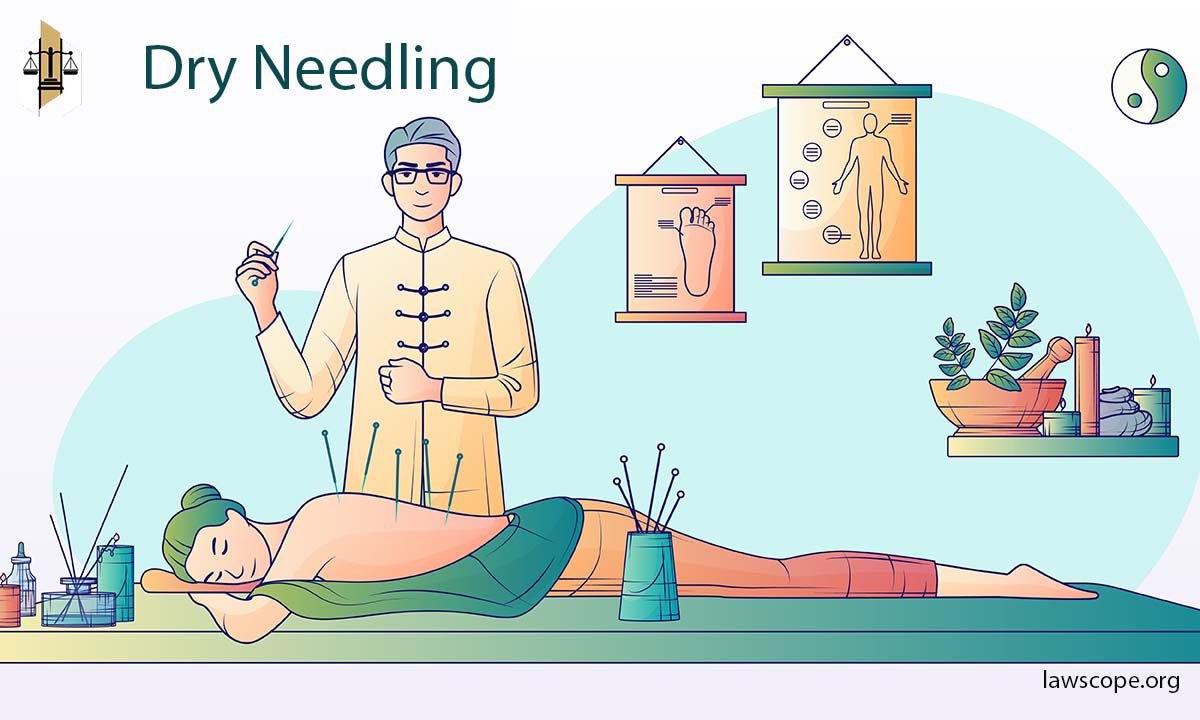Similar to acupuncture, dry needling is becoming more and more popular in the United States as a treatment for musculo-skeletal issues. However, the legality of dry needling is still in dispute in many states. Some consider dry needling to be part of acupuncture. Others allow physical therapists to practice dry needling legally. Why Is Dry Needling Illegal?
The issue lies in the thin needles that are inserted into trigger points in the muscles.
This can cause pain and discomfort.
Some believe dry needling is part of traditional Chinese medicine, while others see it as a legitimate form of physical therapy.
Dry Needling: Knowing The Term Closely
The Cleveland Clinic defines dry needling as “a technique used by some healthcare providers to treat pain.”
Dry needling involves the use of thin needles that are inserted into the skin near or into pain “trigger points.”
These are the areas in the body where the pain comes from or is close to the source of the pain.
Because the needles are small, they don’t hurt as much as having your blood drawn.
In fact, you may not even feel them!
When the needle is placed next to the trigger point, the aim is to reduce tightness, improve blood flow, and reduce local or referred pain.
There are two types of needles used to treat pain. One is called dry needling because there’s no medicine involved.
The other is called trigger point injection because the needles allow for the injection of medicine directly into the muscles.
Despite the benefits of dry needling, there are places where it’s illegal, though not for the reasons you think.
Why Is Dry Needling Illegal In Some States?
There are no complete bans on dry needling in any state in the United States.
However, as of June 2023, dry-needling physical therapists will no longer be allowed to practice in four states: California, New York, Oregon, and Hawaii.
Other states that allow dry needling include Connecticut, Massachusetts, Pennsylvania, Michigan, Missouri, Minnesota, and Oklahoma.
In some states, there are some restrictions on the practice.
For example, in Florida, all physical therapists who wish to practice dry needling will need to have a physical therapist license and meet certain standards.
Some reasons that make this medical process illegal include:
- Medical Risks: Dry needling is a minimally invasive surgical procedure that can cause severe bleeding, bruising, infections, and nerve damage, especially in patients with pre-existing conditions or those who have undergone improper procedures.
- Lack of Standard Training: The lack of national training and certification for dry needling raises questions about the competency of healthcare professionals and the potential for patient harm.
- Acupuncture Misclassification: In some states, the practice of dry needling is illegal because it is classified as a form of acupuncture. Acupuncturists, state lawmakers, and healthcare providers argue that the practice should be regulated.
Why Is Dry Needling Illegal In New York?
Dry needling isn’t allowed in New York because it’s classified as acupuncture by the state’s Board of Physical Therapy.
That means physical therapists aren’t allowed to practice dry needling unless they’re also licensed as acupuncturists.
Dry needling is classified as acupuncture in New York by the State Board of Physical Therapy, which means it’s a regulated practice.
Acupuncture requires specific training and licenses that go beyond what physical therapists are licensed for.
Why Is Dry Needling Illegal In California?
In California, physical therapists are not allowed to practice dry needling.
This is because the state’s Physical Therapy Board considers dry needling to be part of acupuncture, a practice that requires separate licenses.
The physical therapy board sees dry needling in the same light as acupuncture, which is a medical practice that is regulated in California.
Acupuncture requires special training and licenses outside of physical therapy, meaning that physical therapists cannot practice dry needling unless they are also licensed as Acupuncturists.
Why Is Dry Needling Illegal In India?
There are no specific laws that prohibit dry needling in India. Thus, a lot of therapists and practitioners indulge in dry needling in India.
Dry Needling And Its Future Prospects
Dry needling is gaining popularity among both physical therapists and patients due to its demonstrated effectiveness.
It is expected to see increased utilization in sports medicine, where it can effectively address injuries like tennis elbow and rotator cuff problems.
Additionally, dry needling holds promise in chronic pain management, offering relief to patients suffering from conditions such as fibromyalgia and chronic low back pain.
As more research and clinical evidence support its efficacy, dry needling is likely to become a more widely adopted treatment option across various healthcare settings.
However, in some states, the legality of the use of dry needling is still controversial due to safety concerns, as well as the scope of practice that physical therapists are allowed to practice.
Future regulations may also be implemented to ensure the safe and effective use of this practice.
Despite these promising opportunities, more research needs to be done to ensure the practice’s safety and proper use.
Related Content: Is Prank Calling Illegal In The United States?
Bottom Line
Why Is Dry Needling Illegal?
Dry needling remains a controversial practice, its legality varying across jurisdictions.
While proponents argue its efficacy in treating muscle pain and dysfunction, opponents cite concerns over safety, insufficient regulation, and potential overlap with acupuncture.
The lack of standardized training and certification contributes to its legal ambiguity.
Addressing these concerns through clear regulations and comprehensive training programs could help resolve the debate surrounding dry needling’s legality and ensure safer practices in the future.
You May Like Also:





Leave a Reply